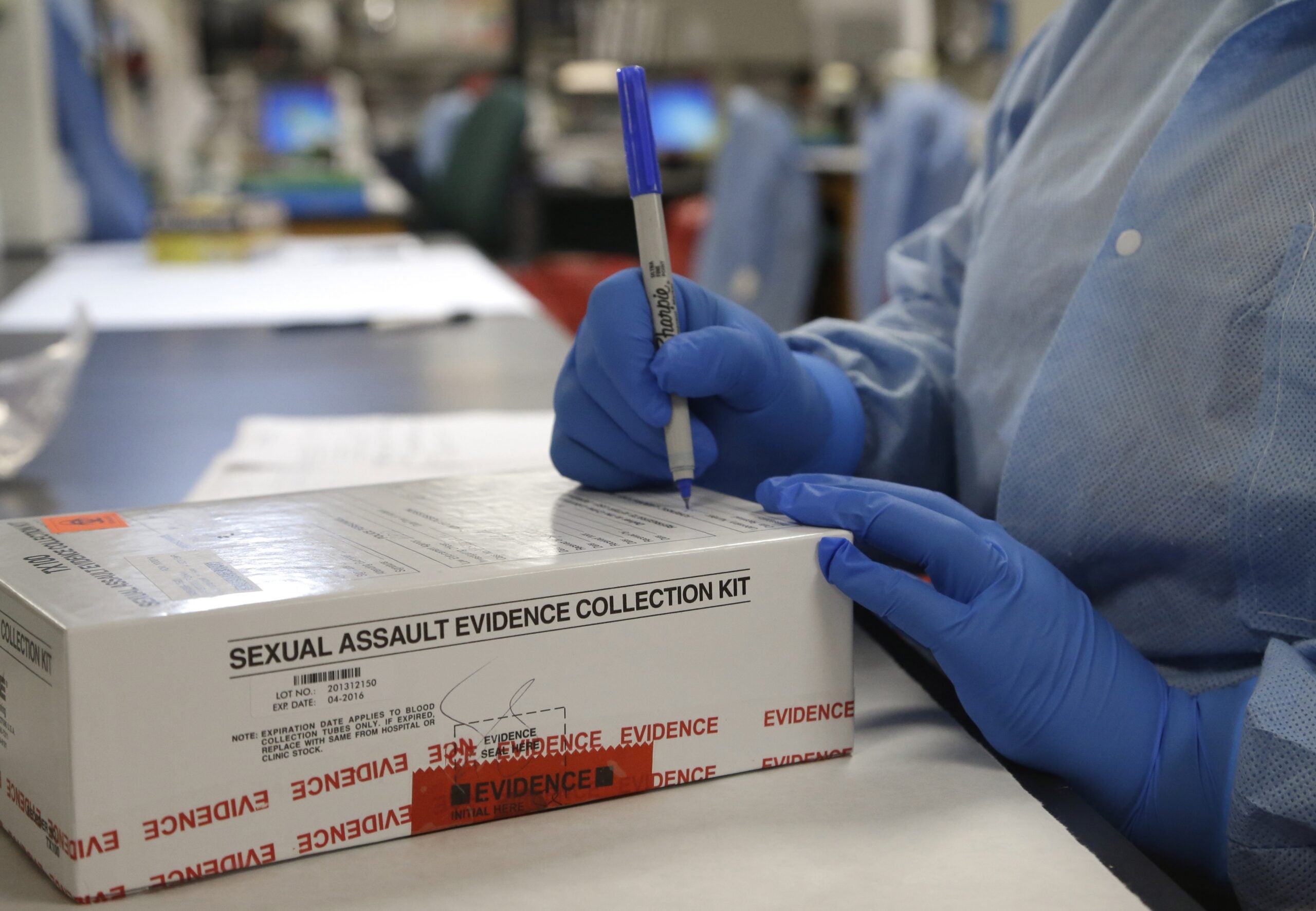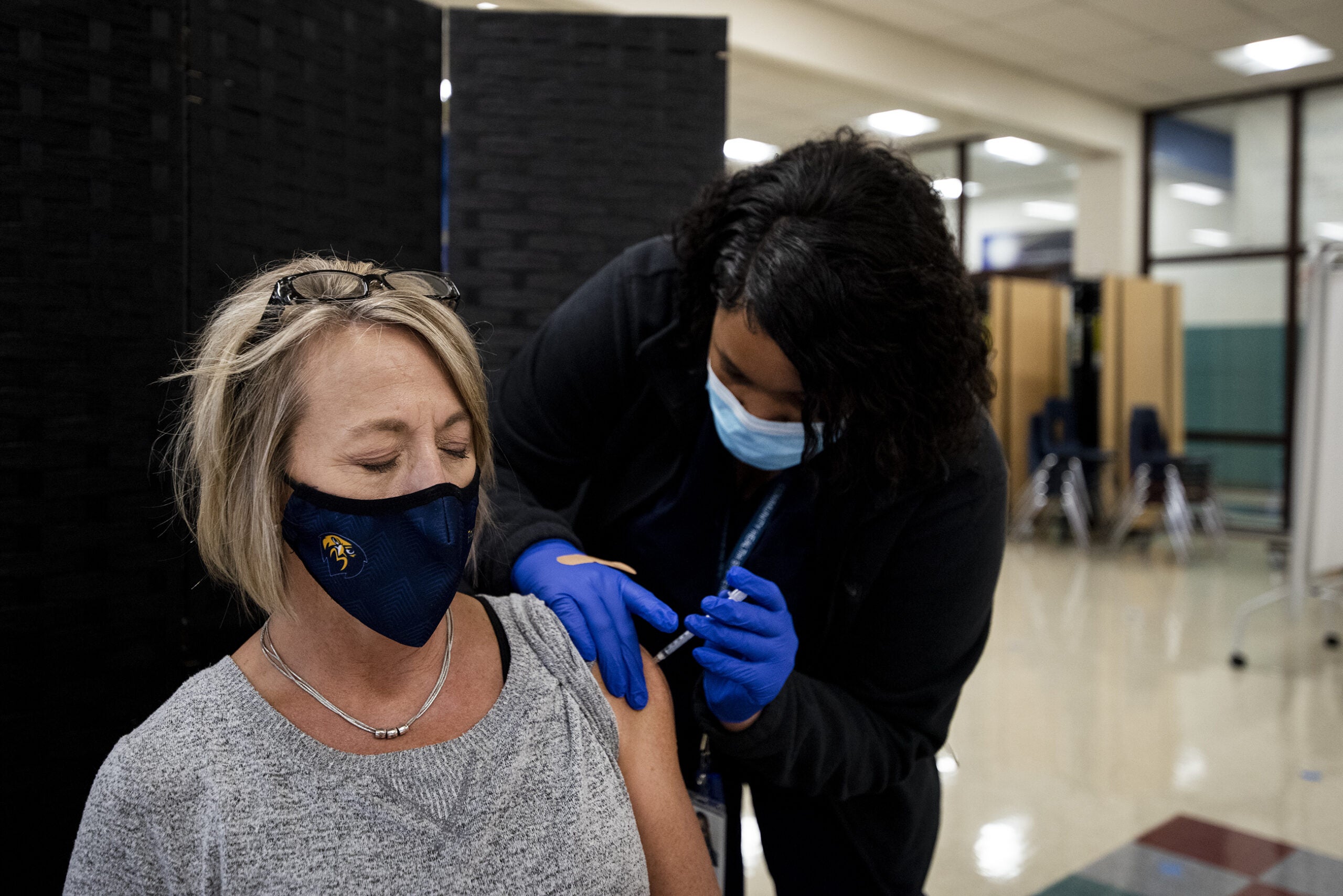One of the most persistent demographic differences in embracing the COVID-19 vaccine is sex — with women consistently getting vaccinated at higher rates than men.
In an in depth look at vaccine uptake, WisContext reports that the COVID-19 vaccination gap between females and males in Wisconsin is nearly 7 percent.
When it comes to getting at least one dose, as of Nov. 28 a total of 55.2 percent of males 12 and older have gotten the shot in comparison with 62 percent of females, for those fully vaccinated, the difference is 52.3 percent and 59.2 percent respectively.
News with a little more humanity
WPR’s “Wisconsin Today” newsletter keeps you connected to the state you love without feeling overwhelmed. No paywall. No agenda. No corporate filter.
WisContext points to several factors that could play a role in the vaccination gender gap, including the fact that a larger number of older adults are women and more women work in fields like health care and education — both areas that have been prioritized in vaccination distribution.
But there are other influences, including differences in perceived gender roles, attitudes toward preventive health practices and partisan political dynamics.
“Our health behaviors are very gendered and are one of the ways that we sort of perform our gender,” University of Wisconsin-Milwaukee epidemiologist Amanda Simanek told WisContext. Such norms may help explain why women tend to be more proactive about their health, she added.
Wisconsin DHS: COVID-19 Weekly Recap
The seven-day average for new COVID-19 cases in Wisconsin is 3,183 as of Friday. The Wisconsin Department of Health Services has confirmed 9,344 total deaths from the disease.
56.4 percent of Wisconsinites are fully vaccinated — 84.5 percent of people age 65 and older and 47.1 percent of children age 12 to 15.
Mercury Marine expanding in Fond du Lac, Indiana
Mercury Marine, a boat motor company in Fond du Lac, is expanding its campus another 100,000 square feet in additions to its already 3 million square feet, according to the FDL Reporter. The company is also expanding to Indiana to relocate its parts distribution center, Mercury Marine announced Monday.
The new location near Indianapolis will house parts and accessories, work on delivery and service and decrease logistics costs, the company said in a press release.
Since 2009, Mercury Marine has invested more than $1.7 billion in capacity and expansion. The company employees more than 4,000 people in Fond du Lac and has more positions to still be filled.
Evers signs bills to improve sexual assault kit process

Gov. Tony Evers signed bipartisan bills establishing a first-ever process for collecting and tracking sexual assault evidence kits, proposals that stalled for years over partisan bickering despite widespread support among law enforcement agencies, victims’ advocates and others across Wisconsin.
Evers’ signature of the measures Monday drew praise from Democratic Attorney General Josh Kaul and Republican lawmakers. It completes a years-long struggle to create protocols in the law for processing and retaining the kits, which can provide integral evidence in sexual assault cases.
Evers said the new laws will increase transparency and accountability in the state’s testing process.
Lack of broadband internet access affects urban as well as rural communities
Inadequate internet service has been a longstanding issue in rural communities across the country, but the problem has only accelerated during the pandemic as many workplaces and schools shifted away from in-person activities.
According to a Milwaukee Journal Sentinel report, a “significant portion of people in rural Wisconsin — and millions across the country — lack an online connection that’s sufficient for even basic tasks such as uploading a video or taking an online class.”
The report continues that while the problems of rural communities is well-known, many urban homes are also without broadband service. “The families hurt the most are those who can least endure another hardship: people of color in low-income neighborhoods,” the report said.
The story suggests that “millions of city dwellers are at risk of falling behind in education, employment and health care — just like their rural counterparts — because they lack adequate home internet access.”
According to an Alliance for Excellent Education study in 2020, about 31 percent of Black and Latino families don’t have broadband access at home as compared to 21 percent of white families.
La Crosse County could see $3.5M in state’s opioid settlement
La Crosse County could receive about $3.5 million of the state’s $420 settlement with prescription drug distributors and retailers, according to a story by the La Crosse Tribune.
The settlement arose because of the organizations’ role in the national opioid epidemic. Every county in the state — except for Polk County — and 16 cities joined the suit.
The story reported that about 70 percent of the funds will be divided between the communities and will be distributed based on population and the impact the opioid crisis has had on municipality.
La Crosse County would “specifically be looking at about $4,641,001 from the agreement, but at least 25 percent of that will be paid in attorneys fees, leaving roughly $3.5 million leftover for the county to use,” the newspaper reported.
Worldwide vaccine distribution is lagging, so variants are spreading
Throughout the pandemic, public health experts have said worldwide vaccination is the only way to really get out of it.
But the handling of COVID-19 delta and omicron variants indicate that we’re far from that goal, reports NPR.
“The world has totally lost the plot on this pandemic,” said Madhukar Pai, McGill University professor in the departments of epidemiology and biostatistics.
“Especially after the Delta variant pretty much decimated India, we knew allowing this virus to rip unchecked through populations was a disastrous idea. Because new variants will come (and) mutations will happen if billions of virus particles are manufactured in millions of people,” he added. “And since then, me and several other people have been screaming about the inequities that are widening and widening and widening.”
While the U.S. and other wealthy nations push booster shots, only 7 percent of the entire continent of Africa is fully vaccinated against COVID-19.
Richer nations are also buying more vaccines than they are using.
World health experts had a goal set in early 2020 to deliver 2 billion doses of vaccine across the world by the end of 2021. But Dr. Tedros Adhanom Ghebreysus of the World Health Organization said only 600 million doses have been distributed so far.
“We have often said as long as vaccine inequity persists, the more opportunity the virus has to spread and mutate in ways no one can prevent or predict,” the New Indian Express reported Dr. Tedros saying on Monday.
Wisconsin Public Radio, © Copyright 2026, Board of Regents of the University of Wisconsin System and Wisconsin Educational Communications Board.







